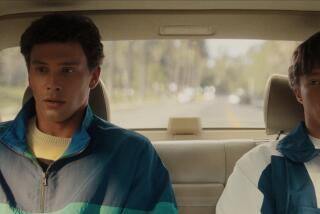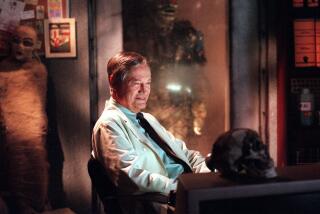Frankie’s Director Goes to Hollywood
- Share via
The setting: an ancient stone fortress, dank, grim and forbidding, incongruously filled with electrical devices and complex machinery. A determined, solitary figure, dressed in surgeon’s garb, pulls on a pair of rubber gloves and prepares to begin his work.
Scalpel in hand, he carefully slices open the forehead of his patient, a man lying on a table--suspended by chains from the high ceiling--and encircled from head to foot by a dozen metal rings. Seconds later, he removes the man’s brain and replaces it with a new one.
Colin Clive and Boris Karloff in “Frankenstein”?
Guess again. It’s Brendan Fraser and Sir Ian McKellen in a new film about the last days of director James Whale, the expatriate Englishman who made “Frankenstein” and such other early horror classics as “Bride of Frankenstein,” “The Invisible Man” and “The Old Dark House.”
Whale died under mysterious circumstances in 1957. An openly gay man in the otherwise repressed Hollywood of the 1930s, he was variously rumored to have committed suicide, been murdered or simply fallen into his own swimming pool and accidentally drowned.
“No one really knows exactly what happened to James Whale,” Fraser says during a break in shooting on the re-created “Bride of Frankenstein” set near downtown L.A. “There is speculation that there was foul play, because there was a hush-hush conspiracy, and people who knew him who are still alive aren’t really talking about it.”
“Gods and Monsters” is the name of the film, written and directed by Bill Condon (“Candyman: Farewell to the Flesh,” cable’s “White Lie”) based on Christopher Bram’s 1995 novel “Father of Frankenstein.” Clive Barker, the horror-meister who gave us “Hellraiser” and “Nightbreed,” is executive producer of the film, which as yet has no distributor.
Barker believes that Whale’s 1935 “Bride of Frankenstein” is the greatest American horror film ever made. “It’s a brilliant synthesis of the comedic, the tragic, the camp and the Expressionist,” he says. “It moves effortlessly in its very short running time [75 minutes] from one mood to another.”
McKellen plays Whale, not only in his last days but in multiple flashbacks to Whale’s stint in the trenches of World War I and his celebrated time as Universal’s premier director of the macabre. For the latter, Condon & Co. re-created the “Frankenstein” sequence but with a significant change: Fraser, as Whale’s gardener Clay Boone, is imagined to be operating on McKellen on the table where Karloff (and, in “Bride,” Elsa Lanchester) once lay.
Why was the celebrated Shakespearean actor so keen to play James Whale? “It’s an English part in an American movie--an English part that wasn’t offered, as far as I know, to Jeremy Irons, Anthony Hopkins, Albert Finney or Rupert Everett,” he says with a smile.
In a more serious moment, he points out a number of parallels in their lives: “He was born within 50 miles of where I was born. He was an actor for much longer than he was a director; he didn’t start directing until he was 42. So he’s from a world that I understood. And he was a gay man in Hollywood, like me.”
The script, says McKellen, 58, “is about a man who’s dying. He has stopped living, and he’s trying to take control of his death, organize it. En route, it’s fascinating, because you get a sense of what Hollywood was like, not just in the ‘50s but in the ‘30s. It’s as good a backstage story as any I’ve read about what it’s like to be a filmmaker.”
Fraser’s character, on the other hand, is a complete fabrication, the catalyst for the film’s action. “Clay Boone is essentially the monster from Mary Shelley’s ‘Frankenstein.’ All the beats are the same: a man who didn’t want life, who is doomed to wander, cannot kill his creator and wants love.”
In the script, Boone reluctantly agrees to pose for Whale the painter. The retired director and the ex-Marine “become friends in spite of the chaotic world that surrounds them,” Fraser explains. “They’re such an unlikely couple: One is gay, one is straight. Somewhere along the way they have to find a middle ground.”
All this seems very far afield from the actor’s recent hit, Disney’s cartoon-like “George of the Jungle.” Fraser, 28, wanted to work with McKellen (“a hero of mine since my training days”) and was intrigued by the multiple levels of the script: “intelligent, dialogue-rich, complex relationships depicted in a venue that’s based in reality and then almost metaphysics, shellacked with a bit of the horror genre, that’s also historically accurate.”
Condon, the writer-director, laughs about a colleague’s description of “Gods and Monsters” as “a gay ‘Sunset Boulevard,’ which seemed redundant to me.” Rather, he says, “it is about the waning of an artist’s powers, about someone who is at that point in his life when death is staring him in the face and he’s taking stock. It certainly isn’t a ‘gay’ movie. I think of it as a gay/straight movie.”
Whale considered “Bride of Frankenstein” his “comedy about death.” Condon thinks of his movie in the same terms, because Lynn Redgrave offers an eccentric performance as Whale’s fussy maid, not unlike Una O’Connor’s outrageously comedic turn in “Bride.”
“There’s a slight stylization to everybody” in this film, Condon says. “If you were to talk about theatrical vs. naturalistic, I think this has gone an inch in the direction of the theater. Which is right for a story about James Whale.”
Condon had to shoot the film in 24 days during the summer so that McKellen could begin rehearsals on Christopher Hampton’s translation of Ibsen’s “Enemy of the People,” directed by Trevor Nunn at London’s National Theatre.
But on a shoestring budget of just $3.5 million, Condon was forced to lose some major set pieces. The ones that remain are the “Frankenstein” set re-creation and an afternoon party that director George Cukor throws for Britain’s Princess Margaret, attended by Whale and Boone.
So what happened to Whale’s career as a director? “I don’t think he was ostracized by a straight and homophobic community,” maintains Barker. “He wasn’t the easiest of men; he was prickly and a snob.” But, he adds, “in terms of his sexual persuasion, he was extremely brave for his time. He was out there.”
More to Read
Only good movies
Get the Indie Focus newsletter, Mark Olsen's weekly guide to the world of cinema.
You may occasionally receive promotional content from the Los Angeles Times.










